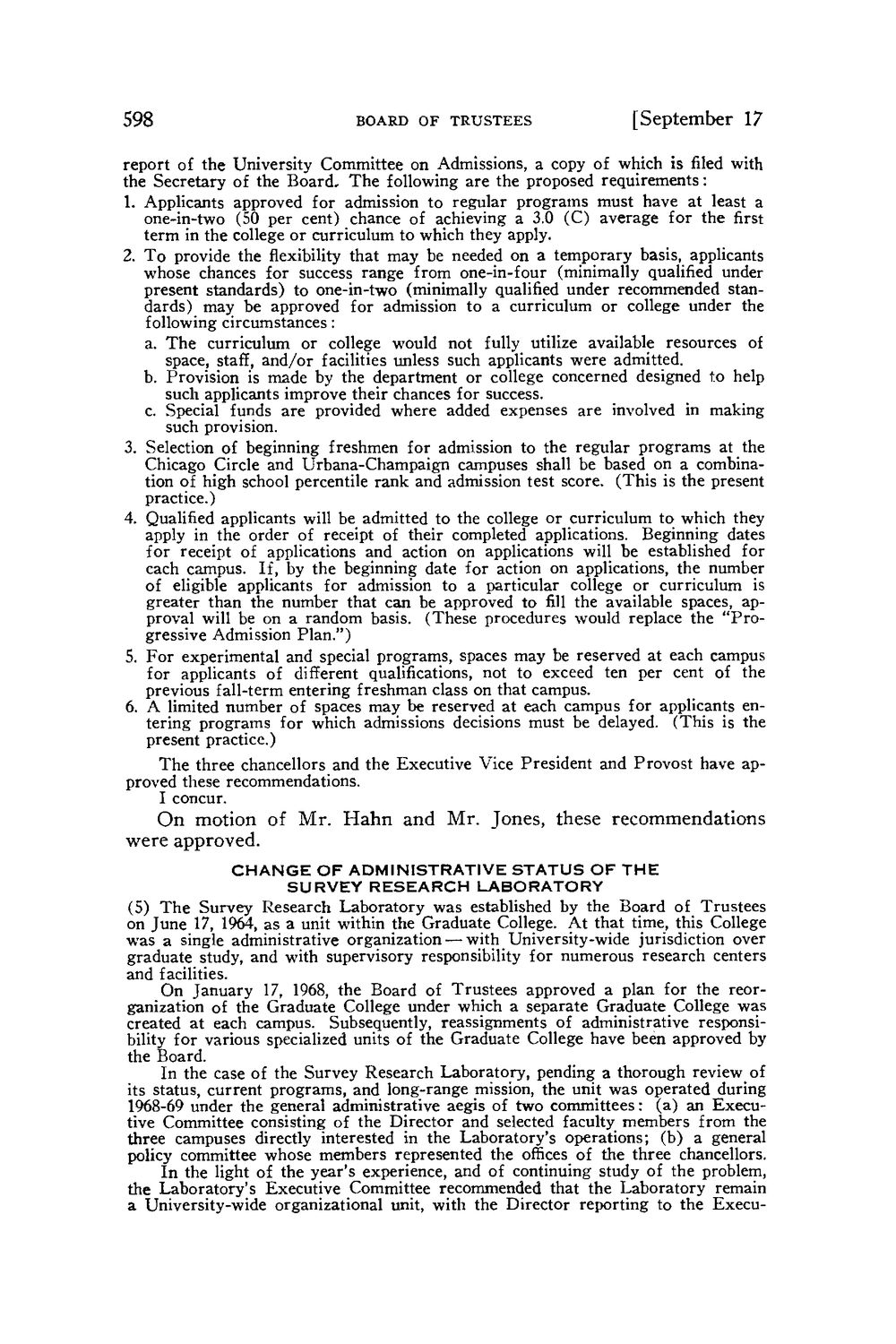| |
| |
Caption: Board of Trustees Minutes - 1970
This is a reduced-resolution page image for fast online browsing.

EXTRACTED TEXT FROM PAGE:
598 BOARD OF TRUSTEES [September 17 report of the University Committee on Admissions, a copy of which is filed with the Secretary of the Board. The following are the proposed requirements: 1. Applicants approved for admission to regular programs must have at least a one-in-two (50 per cent) chance of achieving a 3.0 (C) average for the first term in the college or curriculum to which they apply. 2. T o provide the flexibility that may be needed on a temporary basis, applicants whose chances for success range from one-in-four (minimally qualified under present standards) to one-in-two (minimally qualified under recommended standards) may be approved for admission to a curriculum or college under the following circumstances: a. T h e curriculum or college would not fully utilize available resources of space, staff, and/or facilities unless such applicants were admitted. b. Provision is made by the department or college concerned designed to help such applicants improve their chances for success. c. Special funds are provided where added expenses are involved in making such provision. 3. Selection of beginning freshmen for admission to the regular programs at the Chicago Circle and Urbana-Champaign campuses shall be based on a combination of high school percentile rank and admission test score. (This is the present practice.) 4. Qualified applicants will be admitted to the college or curriculum to which they apply in the order of receipt of their completed applications. Beginning dates for receipt of applications and action on applications will be established for each campus. If, by the beginning date for action on applications, the number of eligible applicants for admission to a particular college or curriculum is greater than the number that can be approved to fill the available spaces, approval will be on a random basis. (These procedures would replace the "Progressive Admission Plan.") 5. For experimental and special programs, spaces may be reserved at each campus for applicants of different qualifications, not to exceed ten per cent of the previous fall-term entering freshman class on that campus. 6. A limited number of spaces may be reserved at each campus for applicants entering programs for which admissions decisions must be delayed. (This is the present practice.) The three chancellors and the Executive Vice President and Provost have approved these recommendations. I concur. On motion of Mr. Hahn and Mr. Jones, these recommendations were approved. CHANGE OF ADMINISTRATIVE STATUS OF THE SURVEY RESEARCH LABORATORY (5) T h e Survey Research Laboratory was established by the Board of Trustees on June 17, 1964, as a unit within the Graduate College. At that time, this College was a single administrative organization'—-with University-wide jurisdiction over graduate study, and with supervisory responsibility for numerous research centers and facilities. On January 17, 1968, the Board of Trustees approved a plan for the reorganization of the Graduate College under which a separate Graduate College was created at each campus. Subsequently, reassignments of administrative responsibility for various specialized units of the Graduate College have been approved by the Board. In the case of the Survey Research Laboratory, pending a thorough review of its status, current programs, and long-range mission, the unit was operated during 1968-69 under the general administrative aegis of two committees: (a) an Executive Committee consisting of the Director and selected faculty members from the three campuses directly interested in the Laboratory's operations; (b) a general policy committee whose members represented the offices of the three chancellors. In the light of the year's experience, and of continuing study of the problem, the Laboratory's Executive Committee recommended that the Laboratory remain a University-wide organizational unit, with the Director reporting to the Execu-
| |